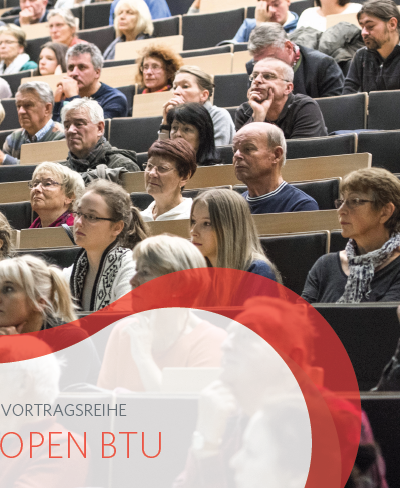Open BTU: Empathy, guilt and forgiveness after the Second World War
1st lecture
The power of forgiveness
It is about dealing with our guilt appropriately. Guilt demands forgiveness. Forgiving does not mean excusing, saying: "You are not to blame!". Forgiving does not mean trivializing, saying: "It's not that bad!". Forgiving does not mean forgetting, saying: "Forget it!". To say: "I forgive you!" means: "Despite your guilt, I accept you!".
Speaker: Thomas Besch, qualified theologian, Provost,Catholic Provost's Office Cottbus
2nd lecture
Empathy and knowledge. Memories of National Socialism and the Second World War in Europe
Memories of National Socialism, fascism, the Second World War and the Holocaust have consistently served the construction of meaning and the creation of meaning in Europe after 1945. They were shaped by past experiences as well as by the orientation needs of the present and expectations for the future. The governments' politics of remembrance in particular were intended to lend meaning to history retrospectively. However, memories have remained controversial throughout, both within the states and between them, and until 1990 also between the power blocs during the Cold War. Moreover, memories within families, small groups and oppositional circles have consistently differed from the official politics of memory. In order to recognize the emotions and identities that are often associated with the conflicts, but also to reflect on them critically, empathy is necessary, both in the individual societies and across borders in Europe. However, as the lecture also argues, empathy requires a precise knowledge of how the respective neighbors deal with their history. A common culture of remembrance among Europeans is therefore neither possible nor desirable; however, an understanding of the common and separate recent past can certainly be achieved.
Speakers: Prof. Dr. Arnd Bauerkämper, Freie Universität Berlin, Chair of Modern History
Moderation: Nicole Nocon, generationE e.V.
The lectures are organized in cooperation with the Akademieforum Cottbus e.V. You can find the association's program at www.kath-cottbus.de.
The event is kindly supported by the Konrad Adenauer Foundation.
About the Open BTU lecture series
From April 10 to June 12, 2024, the public lecture series "Open BTU" offers interesting insights into exciting scientific fields. In the summer semester, the following topics will be examined from different perspectives:
- Empathy, guilt and forgiveness after the 2nd World War
- Sorbian/Wendish culture in the current transformation process
- The effects of populism on the economy and social groups
- Trees in transition - challenges and opportunities (as part of the 32nd Cottbus Environment Week)
- Battery research for the energy transition - prospects for innovative battery recycling
With this educational format, which is open to all interested parties, the university's Centre for Continuing Education supports lifelong learning and funds the transfer of knowledge and ideas in the region by addressing socially relevant issues. The BTU cooperates with other universities and institutions. Each lecture will be followed by an opportunity for questions and discussion with the speakers. Anyone interested is cordially invited to take part in the wide range of events on offer.
Date comment:
The Open BTU lecture series can be attended free of charge and without registration. After each lecture, you will have the opportunity to talk to the speakers.
Venue
Audimax
Zentrales Hörsaalgebäude
(ZHG)
Zentralcampus
Konrad-Wachsmann-Allee 3
03046 Cottbus
Contact us
Zentrum für wissenschaftliche Weiterbildung (ZWW)
T +49 (0) 355 69-3680
thomas.hasenauer(at)b-tu.de

